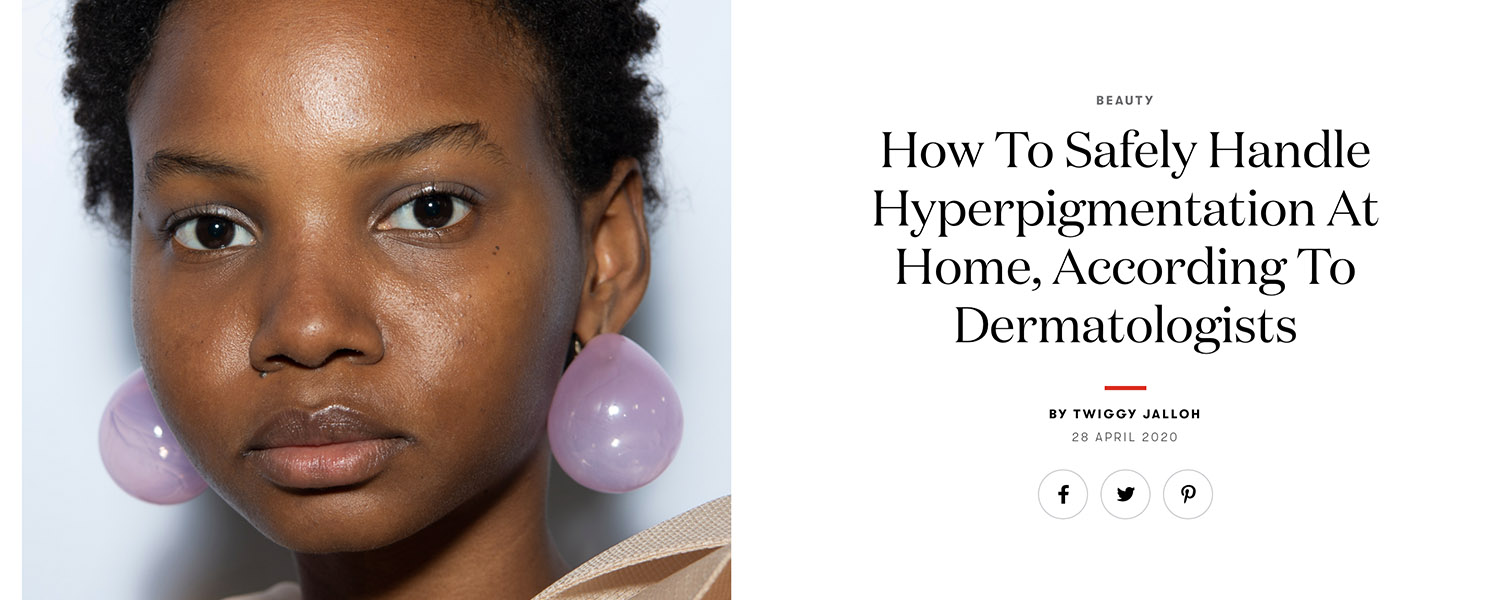
Hyperpigmentation, a common dermatological issue that manifests in darker patches appearing on the skin, can be difficult to tackle effectively. Persistent dark marks can appear following inflammation caused by acne, as a result of changing hormones, pregnancy, excess sun exposure, or genetic melasma. Though pigmentation in the form of freckles is now rightfully embraced, the non-uniform appearance of hyperpigmentation can be a source of insecurity for many.
It’s even trickier to deal with on darker skin tones, as patches tend to emerge with a higher pigment, and take a great deal longer to fade than on lighter complexions. Many resort to using unsafe lightening creams in an attempt to eradicate the marks, which rarely work long-term and leave the skin more susceptible to harmful sun damage.
If you suffer with hyperpigmentation, there are a number of over-the-counter products, dermatologist-approved, professional-grade formulas and innovative cosmetic treatments that can target dark patches with the aim of fading them effectively – and safely.
Here, dermatologists share their expert tips on getting rid of hyperpigmentation for good.

Dr Munir Somji, aesthetic doctor and founder of Dr Medi Spa
Which products do you recommend using at home?
“The best products for pigmentation are a combination of chemical exfoliants and anti-melanin creams and serums. A vitamin C serum is a great all round chemical exfoliant as it gently peels the skin, as well as blocking some of the pathways that cause pigmentation. We also prescribe glycolic acid during our virtual skin consultations, depending on the sensitivity of skin. It is essential to protect the skin from more pigmentation. We recommend using a sunscreen that has both a chemical and a physical block, which will prevent pigmentation caused by heat and UVA and UVB rays. The higher the SPF the better, and I always recommend using medical grade skincare.”
How much time should you give the products to work?
“Generally all medical grade products take four to six weeks to start working properly. Ensure you understand the frequency, amount and method of application, as this all contributes to the treatment outcome.”
Do home remedies work for reducing hyperpigmentation?
“This face mask has been passed down, edited and honed over generations. It’s my mum’s go-to mask for a glow and also reduces pigmentation! The key ingredient to address pigmentation is turmeric, and in addition, the natural enzymes in the yoghurt are fantastic at removing dead skin cells, and honey is great for its microbial qualities.
“Take 1 tablespoon chickpea flour, 1/4 spoon of turmeric, 1 teaspoon of yogurt, 1/4 teaspoon of manuka honey and mix it together to make a paste. Add yoghurt as required to get a spreadable consistency. Put in the fridge for 45 minutes. On a clean face, apply as a mask and wear for one hour, removing gently with warm water using circular movements. After cleansing, splash cold water on the face. Use three times a week.”
What cosmetic treatments do you recommend once lockdown is lifted?
“The Morpheus 8 treatment, a high-powered radio-frequency facial that can penetrate skin to 4mm, generating collagen. It’s fantastic for acne scarring too. We at Dr Medi Spa have advised a lot of patients to use this time to ‘prep’ their skin for pigmentation treatments, as it can greatly enhance the results of treatments. One of the best treatments for smooth skin is Fractora, a radio-frequency machine, which can shatter deep pigmentation.”
Read more: The Ultimate Rosacea-Friendly Skincare And Beauty Routine

